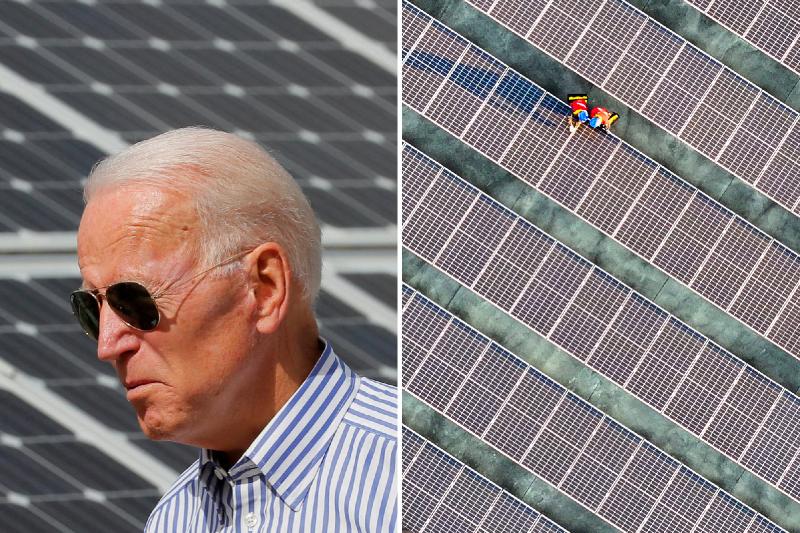Taxpayer subsidies haven't made wind and solar power cheaper or better for Americans
By: Bjorn Lomborg



Despite us constantly being told that solar and wind are now the cheapest forms of electricity, governments around the world needed to spend $1.8 trillion on the green transition last year.
"Wind and solar are already significantly cheaper than coal and oil" is how President Biden conveniently justifies spending hundreds of billions of dollars on green subsidies.
Indeed, arguing that wind and solar are the cheapest is a meme employed by green lobbyists, activists and politicians around the world.
Unfortunately, as the huge subsidies show, the claim is wildly deceptive.
Wind and solar energy only produce power when the sun is shining or the wind is blowing. The rest of the time, their electricity is infinitely expensive and a backup system is needed.
This is why global electricity remains almost two-thirds reliant on fossil fuels — and why we, on current trends, are an entire century away from eliminating fossil fuels from electricity generation.
It is often reported that large, emerging industrial powers like China, India, Indonesia and Bangladesh are getting more power from solar and wind. But these countries get much more additional power from coal.
Last year, China got more additional power from coal than it did from solar and wind. India got three times as much, while Bangladesh got 13 times more coal electricity than it did from green energy sources, and Indonesia an astonishing 90 times more.
If solar and wind really were cheaper, why would these countries miss out? Because reliability matters.
The typical way to measure the cost of solar simply ignores its unreliability. The same is true for wind energy.
Biden's Energy Information Administration puts solar at 3.6¢ per kilowatt hour, just ahead of natural gas at 3.8¢. But if you reasonably include the cost of reliability, the real costs explode — one peer-reviewed study shows an increase of 11 to 42 times, making solar by far the most expensive source of electricity, followed by wind.
The enormous additional cost comes from the need for storage. Electricity is required even when the sun is not shining and the wind is not blowing, yet our battery capacity is woefully inadequate.
Research shows that every winter, when solar contributes very little, Germany has a "wind drought" of five days when wind turbines also deliver almost nothing. That suggests batteries will be needed for a minimum of 120 hours — although the actual need will be much longer since droughts sometimes last much longer and recur before storage can be filled.
A new study looking at the United States shows that to achieve 100% solar or wind electricity with sufficient backup, the US would need to be able to store almost three months' worth of annual electricity. It currently has seven minutes of battery storage.
Just to pay for the batteries would cost the US five times its current GDP. And it would have to repurchase the batteries when they expire after just 15 years.
Globally, the cost just to have sufficient batteries would run to 10 times the global GDP, with a new bill every 15 years.
The second reason the claim is false is that it leaves out the cost of recycling spent wind turbine blades and exhausted solar panels. Already today, one small town in Texas is overflowing with thousands of enormous blades that cannot be recycled.
In poor countries across Africa, solar panels and their batteries are already being dumped, leaking toxic chemicals into the soil and water supplies. Because of lifetimes lasting just a few decades, and pressure from the climate lobby for an enormous ramp-up in use, this will only get much worse.
One study shows that this trash cost alone doubles the true cost of solar.
If solar and wind really were cheaper, they would replace fossil fuels without the need for a grand push from politicians and the industry.
If we want to fix climate change, we instead must invest a lot more in low-CO₂ energy research and development. Only a significant boost in research and development can bring about the technological breakthroughs that are needed — in reducing trash, in improving battery storage and efficiency, but also in other technologies like modular nuclear — that will make low-CO₂ energy sources truly cheaper than fossil fuels.
Until then, claims that fossil fuels are already outcompeted are just wishful thinking.
Bjorn Lomborg is president of the Copenhagen Consensus and visiting fellow at Stanford University's Hoover Institution. His latest books include "False Alarm" and "Best Things First."
Trolling, taunting, spamming, and off topic comments may be removed at the discretion of group mods. NT members that vote up their own comments, repeat comments, or continue to disrupt the conversation risk having all of their comments deleted. Please remember to quote the person(s) to whom you are replying to preserve continuity of this seed.
No Trump, Fascism References, Memes, Source Dissing.




Why that can't be the case................./S
"The rest of the time, their electricity is infinitely expensive and a backup system is needed."
And that system right now is mostly natural gas in the US. It's got to be up and ready to go at all times.
We are going to run out of economically viable oil and gas before long so if you oppose solar, hydroelectric, wind and nuclear then what's up?
How long would that be? Certainly not in our lifetimes.
The author sure has a way with words. The phrase "infinitely expensive" emotively expresses the fact that when natural energy sources (e.g. sun and wind) are not present, the generation of power is 0 ... and if we calculate the cost per kilowatt generated, any cost would be division by 0 or ... infinite. Ridiculous hyperbole.
Well, yeah, we do need reliability. So while these technologies mature we will keep our current base. The idea is to transition from fossil fuels, not to just drop them and immediately flip everything to renewables.
The key to reliability will be batteries. That is what you see nowadays in modern solar systems. The battery technology has greatly improved (and with the demand will improve at a faster rate) to the point where battery systems are practical. So, for example, a solar system for a home equipped with batteries would be able to provide continuous power and would serve as a backup system if one is disconnected from the grid (i.e. a power failure). When the sun is shining, the batteries recharge. Further, when the batteries are full there is an option to gain credits from the grid by selling energy to the power company (albeit at a lower price).
Our worldwide infrastructure has been built on fossil fuels. Of course they will be cheaper now. And if we are smart, we will continue to transition to renewables and then they will be cheaper. In addition, they will be cleaner, more transportable, in abundance, and likely net cheaper than fossil fuels are now.
Don't do everything to resist change, instead look for ways to embrace change in a practical manner.
"The key to reliability will be batteries."
Practical on a very local basis like a house or small building, but it's gonna take a whole lot of batteries to back up a city's power supply.
It takes a whole lot of everything to run a city. Have you not noticed the progression of technology over the past 80 years ... and how much faster technological advancements have been in the past 20?
In many dimensions, what was unimaginable 30 years ago is reality today. Do you remember life prior to the internet, cellular grid, and intelligent pocket devices?
Meanwhile at my house, I get to write off all the costs of my solar generation
and pay on average $20.00 a month for using Oncor's distribution network to sell them my excess electricity
or purchase a little extra from them in January - February.
Like it or not, it's coming. Wind, solar and storage.
Wind mills all over West Texas not generating electric because there is no storage, no interstate connectivity
and no high voltage lines to DFW or Houston is the state of Texas' fault but also the result of their natural bias towards
oil & gas.
Resistance is futile.
It could be that tariffs add unnecessary cost. And if you can fucking well believe it, and I can hardly believe it myself, Janet Yellen is complaining that China is OVERPRODUCING necessary green energy producing products.